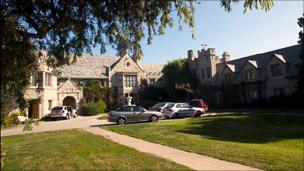What has Playboy ever done for free speech?
- Published
Hefner and Playboy get literary awards
It may surprise some, but the founder of Playboy magazine - Hugh Hefner - has been given two literary awards. The 84-year-old, who has published nude photographs of women for more than 50 years, was honoured for the articles that accompany the pictures and his commitment to free speech. Rajesh Mirchandani went to the famous Playboy Mansion in Beverly Hills to meet him.
There are few houses as famous as their occupants: Buckingham Palace, Neverland Ranch, the Playboy Mansion.
Steeped in Hennessey as much as in history, this lush corner of Beverly Hills is infamous for the parties it has hosted, all under the shrewd eye of Hugh Marston Hefner.
The founder and editor-in-chief of Playboy Magazine says he will never move out of the mansion while he's alive.
It's clear the building and the empire that funds it are the products of more than half a century of fighting for what he believes: that pictures of naked women are not pornographic, not exploitative, and should not be censored.
Of course, many disagree on each of those points. But it is the issue of freedom of the press that we are here to discuss.
We wait in the dark wood-panelled living room that boasts a church organ (damaged from a leaky roof), a 20ft cinema screen and projectors (movie nights are Friday through Monday), a reproduction Picasso (a topless woman, what else?) and antique bunny figurines. Hugh Hefner enters through velvet curtains, dressed in black silk pyjamas and a red silk bathrobe. At 84, he still plays the Lothario, bright-eyed and bed-ready.
'Serious literary writers'
We are here because Mr Hefner or Heff (along with other American icons like Cher and Jacko, one name suffices), has been honoured by PEN USA, a literary organisation, with two awards that recognise 50 years of support for un-championed writers and of fighting censorship.
I put to him the obvious assumption: that no-one buys Playboy for the writing.
"Oh yes," he insists, "if it was just for the pictures then the most successful magazines would be… hard core pornography. It's the whole package."
At the awards ceremony at a Beverly Hills hotel, which he attended with his family and two young blonde women in eye-catchingly short skirts, he received a standing ovation.
Jamie Wolf, vice-president of PEN USA, told me Mr Hefner "published Saul Bellow, he published Gabriel Garcia Marquez, he published John Updike, he published an extraordinary range of writers, serious literary writers who you were not otherwise getting when you went into the grocery store.
"And he was paying them substantial wages. And some of them were blacklisted writers who other people wouldn't publish.''
Accepting, Mr Hefner spoke not of his career, but of Erwin Arnada, a former editor of Playboy Indonesia who is currently jailed there on public indecency charges.
Past court battles
''I accept this award on behalf of him and all men of good will who believe democracy is founded on freedom of speech and press," Mr Hefner said.

Mr Hefner rents the Playboy mansion from the company
Mr Hefner is also no stranger to fighting for himself.
He has been branded obscene in the past and has fought in court several times. In 1954 he won a legal battle against the US postal service when Postmaster General Arthur Summerfield refused to deliver copies of Playboy on the grounds it was obscene.
Heff told the court: "We don't think Postmaster Summerfield has any business editing magazines. We think he should stick to delivering the mail." Playboy won.
A year earlier the first edition featuring nude pictures of Marilyn Monroe (originally taken not for Playboy but for a calendar) caused a sensation in the sexually repressed post-war 1950s.
"It gave sex a good name," Mr Hefner tells me, "and incorporated it as a natural part of a men's' entertainment magazine."
When I ask what he thought he had done for women, he replies defiantly: "I helped emancipate them."
'We changed the world'
At its height in the 1970s, Playboy magazine was selling seven million copies a month. Its success spawned Bunny Girls - lots of them; nightclubs; merchandise; even a corporate jet called Big Bunny.
These days, rival, harder-core publications, the internet and greater sexual freedoms mean Playboy is less shocking - and less in demand. Its circulation has fallen to below two million a month - still big but nowhere near its former heights.
"We can never have the same power and impact as in the 60s," Heff says. "It was a different time and we changed the world."
The company diversified into cable television in 1982, with programming typically more explicit than the magazine's. But that too has seen a decline in revenue.
The company posted a $51m (£31.8m) loss last year and is poised to lose money again in 2010. The brand image is perhaps its most valuable asset these days, rather the magazine that sparked it all.
A report last year that Heff had sold the mansion was inaccurate. In fact he doesn't even own it but rents it from the company (he owns 70% of the company's voting stock).
He is trying to buy back control of the magazine.
"What we need is an infusion of capital," he said. "If we accomplish that, the future is bright."
He tells me the company is about to open a casino in Macau and that the Playboy clothing brand is big among Chinese men, even though the magazine is not sold there.
"The bunny's back!" he laughs. "You know how bunnies are, they multiply!"
- Published20 October 2010
- Published9 October 2010
- Published12 July 2010